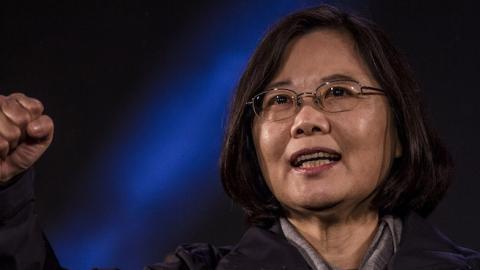President-elect Trump’s decision to answer the phone when Taiwan’s President Tsai Ing-wen called to congratulate him on 2 December was an exercise in good judgment and thinking that is independent of Washington’s foreign policy hive. The hive believes in the diplomatic construct that there is a single China. There are prudential reasons for this construct. But, to the worker bees, it means admiring the Emperor’s new clothes whose political equivalent is that democratic Taiwan is part of the totalitarian Peoples’ Republic of China.
This overlooks that the PRC still considers military force an option to subdue Taiwan. It overlooks that Taiwan is a free political entity whose voters elect their representatives and change their national leadership peacefully while the PRC is a one-party dictatorship in which, as the U.S. State Department notes, “security forces reportedly committed arbitrary or unlawful killings,” besides a host of other repressive acts. It overlooks that Taiwan is the United States’ 10th largest trading partner, ahead of France, India, and Italy.
Mr. Trump’s critics have accused him of breaking protocol, overturning diplomatic tradition, and disrupting the status quo. These are cardinal sins in Washington’s diplomatic establishment. They are not arguments against what Vice-president-elect Pence termed the courtesy of accepting a phone call from the president of Taiwan who, herself, won a landslide victory in the election held this past January.
It is not yet possible to determine what the Trump administration’s policy in East Asia will be. But the president-elect’s brief conversation has provided more substance to the U.S.’s pivot-to-Asia than everything that the Obama administration did since the pivot was announced in 2012.
The president-elect’s critics were wholly silent about Taiwan’s strategic importance to the U.S. and to the security of our East Asian’s treaty allies, Japan, South Korea, Thailand, and the Philippines. The PRC is bracketed by a chain of island nations from Japan south to the Philippines. This island chain peopled in large measure by states that are friendly to the U.S. is a natural and political barrier that bars the Chinese navy from swarming into the Pacific. Our treaty relations with many of the island chain’s individual parts give the U.S. access to the region and can play an even greater role in deterring the PRC as it builds and arms islands in the international waters of the South China Sea.
At the center of this island chain sits Taiwan. It lies at the geographic hinge that separates the East and South China Seas. In both bodies of water, China uses coercion, lawfare, and illegal action in disputes with its neighbors, our friends. Taiwan is 100 miles from the Chinese mainland. China continues to add hundreds of missiles to the area immediately across from Taiwan. It is increasing its amphibious capability and growing its submarine fleet. The former gives China the ability to cross the strait that separates China from Taiwan. The latter, combined with China’s growing surface fleet and land-based naval aviation can threaten Taiwan with a choking blockade. It is worth repeating that China has not renounced nor does it show any sign of renouncing its stated willingness to use force to seize Taiwan.
What Vice-president-elect Pence called the courtesy of the president-elect’s phone call is indeed a courtesy, a gesture. Gesturing is important in policy. President Obama made the wrong ones, for example when in 2009 he bowed to Saudi King Abdullah the monarch of a state in which women are treated as second-class citizens and nonviolent crimes like apostasy and “sorcery” are punishable by death.
By contrast, President-elect Trump’s gesture was intelligent and focused. Those of America’s Asian allies who do not want to see a new U.S. administration cowed by China must have taken heart. So should businesses in the U.S. and Taiwan who look for stronger economic and security ties between Washington and Taipei.
If there is to be no Trans-Pacific Partnership in the Trump administration such other paths as a bilateral trade agreement are open as a means to invigorate the already flourishing trade relations between the U.S. and Taiwan.
Security relations could also use a boost. The Obama administration’s arms sales to assist in Taiwan’s defense have been sporadic and sparse. Taiwan is building its own submarines. The U.S. can and should provide more assistance. The defense of Taiwan is key to America’s interest in East Asia’s stability, democracy, and prosperity. Taiwan’s navy should participate in annual naval exercises that the U.S. conducts in the region. Instead of current practice where visits of U.S. officers are restricted to lower ranks, the commander of U.S. Pacific Forces and of the U.S. Pacific Fleet should be given permission to visit Taipei. Regularly.
Of course, China will object vigorously. But diplomatic demarches and Beijing’s mau-mauing are much to be preferred to looking the other way at China’s continued efforts to isolate and bully a democratic friend to whose defense we are pledged. The president-elect did the right thing.



















